#also i know i used out of stock as an example for a story that you want to disregard the other stuff about
Explore tagged Tumblr posts
Text
the thing that makes me so insane about ggy is that most fnaf books always have one takeaway you're supposed to get by the end of the story that's important and you disregard everything else, like out of stock with plushtrap and dittophobia with how the nightmares work, and usually the everything else actually does have some crazy thing that you dont mind disregarding just bc it's not that good and feels strange paired with whatever the takeaway is
but with ggy, even tho it has the same formula with Gregory being patient 46 being the reveal (and also just the ggy info anyway) and everything else can be disregarded, you dont WANT to because the book is just that good. every single thing they put in ggy served Rabs story somehow and made it so much better. it was so interesting. it was written better than youd expect any fnaf 20k word 60 page short story to be.
the main character is tunnel visioned and still ends up dead despite the narritave trying to save him. he has an obsession with solving mysteries and meets the most mysterious character in the world, ggy, and is driven to his death trying to solve him. his story works perfectly with ggy as a character and they're even literal foils of eachother. the book builds up tony as being a smart investigator then rips that down at the end when it shows just how smart and better rab is than tony. the very nature of rab going to school and having friends isnt even far fetched at all and is very possible
every single thing this book provides for what's supposed to be its takeaway actually makes it better and you want to remember everything about it becuase its it's own story in itself it's that good
#sorry insane about ggy rn#itp ref made the insaneness that never even went away come back even stronger#pandas.txt#pandas talks#ggy#also i know i used out of stock as an example for a story that you want to disregard the other stuff about#but that one doesnt apply its like the 2nd best fnaf book ever behind ggy#its just one of the only ones i can think of that has a mainstream takeaway lmao
45 notes
·
View notes
Note
please help me- i used to be pretty smart but i’m having so much trouble grasping the concept of diegetic vs non-diegetic bdsm!
gfkjldghfd okay first of all I'm sorry for the confusion, if you're not finding anything on the phrase it's because I made it up and absolutely nobody but me ever uses it, but I haven't found a better way to express what I'm trying to say so I keep using it. but now you've given me an excuse to ramble on about some shit that is only relevant to me and my deeply inefficient way of talking and by god I'm going to take it.
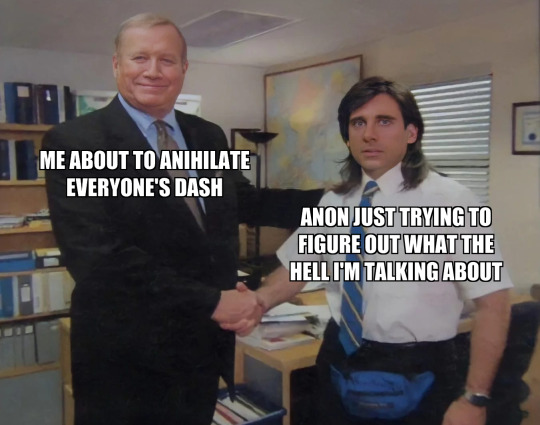
SO. the way diegetic and non-diegetic are normally used is to talk about music and sound design in movies/tv shows. in case you aren't familiar with that concept, here's a rundown:
diegetic sound is sound that happens within the world of the movie/show and can be acknowledged by the characters, like a song playing on the stereo during a driving scene, or sung on stage in Phantom of the Opera. it's also most other sounds that happen in a movie, like the sounds of traffic in a city scene, or a thunderclap, or a marching band passing by. or one of the three stock horse sounds they use in every movie with a horse in it even though horses don't really vocalize much in real life, but that's beside the point, the horse is supposed to be actually making that noise within the movie's world and the characters can hear it whinnying.
non-diegetic sound is any sound that doesn't exist in the world of the movie/show and can't be perceived by the characters. this includes things like laugh tracks and most soundtrack music. when Duel of Fates plays in Star Wars during the lightsaber fight for dramatic effect, that's non-diegetic. it exists to the audience, but the characters don't know their fight is being backed by sick ass music and, sadly, can't hear it.
the lines can get blurry between the two, you've probably seen the film trope where the clearly non-diegetic music in the title sequence fades out to the same music, now diegetic and playing from the character's car stereo. and then there are things like Phantom of the Opera as mentioned above, where the soundtrack is also part of the plot, but Phantom of the Opera does also have segments of non-diegetic music: the Phantom probably does not have an entire orchestra and some guy with an electric guitar hiding down in his sewer just waiting for someone to break into song, but both of those show up in the songs they sing down there.
now, on to how I apply this to bdsm in fiction.
if I'm referring to diegetic bdsm what I mean is that the bdsm is acknowledged for what it is in-world. the characters themselves are roleplaying whatever scenarios their scenes involve and are operating with knowledge of real life rules/safety practices. if there's cnc depicted, it will be apparent at some point, usually right away, that both characters actually are fully consenting and it's all just a planned scene, and you'll often see on-screen negotiation and aftercare, and elements of the story may involve the kink community wherever the characters are. Love and Leashes is a great example of this, 50 Shades and Bonding are terrible examples of this, but they all feature characters that know they're doing bdsm and are intentional about it.
if I'm talking about non-diegetic bdsm, I'm referring to a story that portrays certain kinks without the direct acknowledgement that the characters are doing bdsm. this would be something like Captive Prince, or Phantom of the Opera again, or the vast majority of bodice ripper type stories where an innocent woman is kidnapped by a pirate king or something and totally doesn't want to be ravished but then it turns out he's so cool and sexy and good at ravishing that she decides she's into it and becomes his pirate consort or whatever it is that happens at the end of those books. the characters don't know they're playing out a cnc or D/s fantasy, and in-universe it's often straight up noncon or dubcon rather than cnc at all. the thing about entirely non-diegetic bdsm is that it's almost always Problematic™ in some way if you're not willing to meet the story where it's at, but as long as you're not judging it by the standards of diegetic bdsm, it's just providing the reader the same thing that a partner in a scene would: the illusion of whatever risk or taboo floats your boat, sometimes to extremes that can't be replicated in real life due to safety, practicality, physics, the law, vampires not being real, etc. it's consensual by default because it's already pretend; the characters are vehicles for the story and not actually people who can be hurt, and the reader chose to pick up the book and is aware that nothing in it is real, so it's all good.
this difference is where people tend to get hung up in the discourse, from what I've observed. which is why I started using this phrasing, because I think it's very crucial to be able to differentiate which one you're talking about if you try to have a conversation with someone about the portrayal of bdsm in media. it would also, frankly, be useful for tagging, because sometimes when you're in the mood for non-diegetic bodice ripper shit you'd call the police over in real life, it can get really annoying to read paragraphs of negotiation and check-ins that break the illusion of the scene and so on, and the opposite can be jarring too.
it's very possible to blur these together the same way Phantom of the Opera blurs its diegetic and non-diegetic music as well. this leaves you even more open to being misunderstood by people reading in bad faith, but it can also be really fun to play with. @not-poignant writes fantastic fanfic, novels, and original serials on ao3 that pull this off really well, if you're okay with some dark shit in your fiction I would highly recommend their work. some of it does get really fucking dark in places though, just like. be advised. read the tags and all that.
but yeah, spontaneous writer plug aside, that's what I mean.
#I found their original stuff while I was researching various waterhorses and their folklore for no reason#because one of the characters in their original work happens to be an each uisge#and then it turned out it ALSO included a lot of figures from welsh folklore in general#so yknow if you happen to have my incredibly specific hyperfixations you'll love it but even if you don't it's great#I didn't mean to bring up phantom of the opera so much it just happens to be very relevant to a lot of my talking points#I haven't actually seen it in years
19K notes
·
View notes
Note
Do you have any advice for people making OCs/sonas? Yours are really well rounded and unique and I'd greatly appreciate the insight of someone who got a passion project off the ground!
So this is a very broad topic, and it varies a lot based on your own creative goals, what kind of characters you're creating, and where you want to use them. Creating an OC to be used in furry pinups is a little different than creating one for a dramatic story. But I'll try to give some general advice on how I do things for the types of characters and stories I tend to work with
Heads up: this will be kinda long lol
The germ of an idea
For me, I'll generally be inspired to create a character starting with a small number of core traits. These could be anything. A color scheme, a body type, a job, a hobby, a personality archetype, an outfit, a visual motif, a functional role in a story I'm working on, a noteworthy facial feature, a weapon, a relationship of some sort to an existing character, a single scene or joke I want to use them for. For furries and fantasy characters, species is usually one of the first things I'll have an idea for, which tends to get the ball rolling fairly easily since we have all sorts of cultural associations with different animals and fantasy creatures.
Any standout character trait like this that you find compelling can serve as that initial spark. The inspiration can come from anywhere, but it's often just a matter of knowing yourself and your own tastes. What do you like? What are the people in your life like? What really speaks to you in a character? What's an existing fictional character that you'd like to rewrite and take in a different direction? What's an aspect of yourself that you would like to see represented more often in fiction? It doesn't have to be something super deep or fleshed out right from the start, though. You can start with something as simple as "I want a black cat character" or "I want a character who dresses like an arcade carpet" or "I want a character who looks scary but is actually nice." Whatever it is, it's something that differentiates the new character from the ones I already have, because otherwise I'd just be using them.
Contrast
From there, you can start brainstorming other traits that might go with those core traits. Some of those may be traits that naturally complement each other. Continuing with the black cat example, maybe you wanna play into the common cultural perception of black cats and say that this character brings bad luck, or is associated with witchcraft. However, I often like to give characters contrasting or even seemingly contradictory traits, which can help elevate a character beyond a stock archetype. Real people tend to be a walking ball of contradictions, after all.
I've talked a lot about how I did this with the main cast of SLARPG. Melody is a fox, traditionally a crafty and untrustworthy predator, but she's extremely introverted and gentle. Allison is a bunny, but instead of being a meek and cuddly little prey animal she's an outgoing fighter who loves a challenge, and she has a muscular build. I think this kind of thing gives characters some fun flavor, and can be really effective for both comedy and drama. For an example from something I didn't write, take Senshi from Dungeon Meshi. He's a dwarf, and he embodies certain stereotypical aspects of dwarves - he's a short, buff man with a big bushy beard, he lives underground, he's stubborn and doesn't like elven magic - but he also goes against some of them. Instead of being an expert on mining and blacksmithing, Senshi is a culinary expert who has a deep appreciation for the natural ecosystem of the dungeon. He's a weirdo among dwarves for not caring about the wellbeing of his axe and for using his super awesome shield primarily as a giant wok. And that's what makes Senshi fun and interesting.
So going back to our example, instead of going with the stereotype, we could make a black cat character who has comically good luck, or who's superstitious and afraid of witchcraft, or who's an extremely rational person who always believes in science over superstition. Or maybe you roll with the bad luck angle, but instead make the black cat be the victim of their own bad luck in some interesting way. Maybe this black cat has terrible luck with love and can't hold down a relationship. Maybe this black cat is an aspiring speedrunner who consistently gets the absolute worst RNG possible in every video game due to their own bad luck. Maybe this black cat has accrued a horrendous gambling debt after a long losing streak and has loan sharks coming after them.
These are all just hypothetical examples, of course. I don't exclusively make characters with ironic contradictions like this. The idea is just to build on those core traits you started with in interesting ways, and that's one of my favorite ways to do so. But honestly, a lot of the time execution is more important than the sheer originality of an idea, and sometimes really putting your all into playing a trope you love straight is the right move.
Specificity
Regardless of what direction I take a character in past that initial seed of an idea, the key ingredient tends to be specificity. To give them specific details beyond the most stock possible version of that core idea you started with.
This is something I internalized from Tim Schafer, via a blog post in the behind-the-scenes backer material for Broken Age. Sadly I'm not sure if that stuff is still available, but I did save this particular post about creating characters since it really helped me, so I'll directly quote a chunk of that post here:
No two characters would approach a problem or react to events in the same way. At least, not if you’ve designed the characters well. If you’ve left them too vague or superficial, if they are merely functional elements in your story instead of individuals, then they might react in the same way. And that’s a problem. So to avoid that, I’m going to talk about one the most important parts of character development: specificity. Making sure your character is a specific individual, not a stereotype. A unique character, different from anyone else in the world. It doesn’t mean that they have to have wacky gimmicks, eyepatches and crazy accents. It just means they have to be specific. For example, let's create a new character. Let's say your story has a scene where your main character gets in trouble in school. So you’re probably going to need a school teacher. Imagine a school teacher for a bit. Do you see her in a little red schoolhouse? Maybe a bun in her hair? An apple on her desk? Thick black glasses? Let’s put a ruler in her hand for good measure. Done! We have our teacher character. She’s ready to be in the scene where our hero goes to school and the teacher sends her to the principal’s office for passing notes. Right? I mean, this character doesn’t have too many lines, so why develop her character any more? The problem is that this teacher is a very shallow stereotype of a teacher. She has no specific attributes that make her memorable. She’s the teacher you would get in a set of free clip art. She might not have many lines, but if all your supporting characters are this way, your story will be more bland than it should be. Even if this teacher is only onscreen for a minute, she should be unique and different from any other teacher in the world. Luckily, it's not actually that hard to make her so. You just have to ask some very basic, specific questions.
Tim goes on to explain how simple exercises like filling out character sheets with basic questions about your character (there are a million of these online) can help push a character beyond a stock archetype, even if it's a minor supporting character. Questions about where they're from, their likes and dislikes, their beliefs, their goals in life, that sort of thing. For minor characters especially, a lot of these details may never actually come up in a story, but just asking even a few of these questions and giving them specific answers helps you see them less like an archetype and more like a real person in your head. Maybe you never bring up your character's backstory or their favorite sport or what kind of music they listen to, but just having a specific answer for questions like that might help color the way you depict that character in subtle ways. It makes it feel like they aren't defined by just that one core trait you started with, and helps make the characters and world feel more alive, like there's stuff going on with them beyond the bounds of the story or the drawing.
It's a careful balancing act, though. It's easy for a character to feel like they're a collection of too many unrelated gimmicks and quirks. Again, like Tim said, these specifics don't have to make for the craziest, most original character ever, there just has to be something there.
Let's go back to SLARPG as an example, where I combined broad character archetypes I liked with more specific personal elements that I felt like I wasn't seeing enough in the fiction I liked. Melody is riffing on the common idea of the reserved healer character in the RPG or MMO party and the shy girl archetype, but she's the main hero instead of a supporting player in another person's story, and she's also a fat bisexual trans woman who draws a lot of little details from my own life. Her interests, her relationships, her opinions on things, her personal hangups and dreams, these all set Melody apart from other fantasy healer characters and define her as Melody Amaranth. Specificity!
But it doesn't always have to be super deep, especially if you just want some characters to draw for fun and aren't planning on writing a story with them. Take my fursona. I've always loved dogs, so I made my fursona a dog. I chose a Samoyed in particular because I think Samoyeds are the cutest, and I hadn't seen hardly any anthro Samoyed OCs at the time. I leaned into the breed's signature fluffiness to help my fursona stand out from other canine OCs. She has simple identifying traits like being fat like me, wearing glasses like mine, and having a hairstyle kinda like mine (when I tied my hair up in a bun, at least). And there you go. Fursona achieved. She's not a wildly high concept character, but she doesn't need to be
Anyway I realize that this is mostly about the writing aspect, so here's a few quick bullet points about designing a character's appearance:
Face and body type variety are good, but personally I would say lack of body type variety is worse than same face syndrome
Knowing some stuff about shape language is good, but you don't have to be completely beholden to the "circles are friendly, squares are sturdy, triangles are scary" shit. I'm generally more interested in using repeated shaping in different parts of a character's design as sort of a shape motif. Melody's body, hair, and tail are all made of round, swooping shapes, for example. (This is more applicable if you're designing cartoonier characters as opposed to realistic humans, obviously.)
Knowing some basics of color theory is also good. I like using complementary and contiguous color schemes on characters and generally try not to use too many distinct colors on one design. Black and white and grey and various browns are good as neutral colors to balance out the colors of the rainbow, and gold can be a nice accent color
A small handful of identifying accessories can be fun, but don't rely on those to make a design stand out. Ideally your character should still be identifiable even when not wearing their default outfit, or even in silhouette
Aaaaaand I'm gonna call it a wrap there! This is a huge topic, so hopefully this helps with at least some of the basics! At the end of the day, though, don't beat yourself up if you can't sit down and force yourself to come up with the most crazy awesome OC ever. Just have fun and be yourself!
429 notes
·
View notes
Text
Errors, “Errors,” and Sci Fi
@strawberry-crocodile
tvtropes calls stuff like the wolf example "science matches on" which I think is a pretty fair shake
This. This is what’s got me thinking so much about errors. There’s a certain danger, here. A certain way that this particular effect — delicious dramatic irony — tempts the mind when reading old stories, even true ones.
What do you know about R.M.S. Titanic? I ask my class every year, and the first hand rises. “It was unsinkable,” the student inevitably says, and everyone is nodding, “or so they thought.” I write the word UNSINKABLE on the board, underneath my crude drawing of a ship with four smokestacks. It will be crossed out before the end of the hour, but not for the reason they expect.
“I find no evidence,” Walter Lord, preeminent biographer of the ship’s survivors, wrote, “that Titanic was ever advertised as unsinkable. This detail seems to have entered the collective mind so as to create a more perfect irony.” Indeed, historians’ examinations of White Star Line documents show the shipbuilders themselves worried it would be so large as to risk collision; they stocked several more lifeboats than 1910s regulations required.
The War to End All Wars (deep breath, satisfied exhale), also known as World War ONE. Chuckle. Shake of the head. What if I told you that this phrase, used primarily in American newspapers after the fact, wasn’t meant to be literal? Nowadays we’d say The Mother of All Wars, or One Hell of a Fucking War, but we wouldn’t mean literal motherhood, literal intercourse. What if I said the armistice and the Lost Generation and the Roaring 20s were all braced for another outbreak of European conflict, and yet we still failed to prevent it?
Did you know they were so confident in the safety of the S.S. Challenger that they put a civilian schoolteacher onboard? I do, because I’ve heard that one repeated many times. Only, see, it’s got the cause and effect reversed. Challenger launched on a day the shuttle’s engineers knew to be dangerously cold, because the first civilian in space was on board. And NASA knew its shuttle project would be cancelled entirely, if they couldn’t get that civilian’s much-delayed entry into space in the next two weeks. So they launched on a cold day, and killed her instead.
These are all what cognitive science calls Hindsight Bias on the personal level, what sociology calls Presentism on the cultural level. Social psychology’s a little of both, is primarily interested in why you’re sitting on your couch in a Colonize Mars shirt watching PBS and chuckling at the fools who believed in El Dorado. It wants to know why the mind flees straight from “marijuana will kill you” to “marijuana will cure cancer” without so much as a pause on the middle ground of its real benefits and drawbacks, its real (mild) risks and rewards.
And they can paralyze the sci-fi writer, if you think too much about them. Jetsons is futurist one decade, retro the next. “There are no bathrooms on the Enterprise,” the creators of Serenity say smugly, as if Gene Roddenberry should’ve simply known that decades later it’d be acceptable to show a man peeing in full view of the camera, nothing but the curve of the actor’s hand to protect his modesty. “No sound in space,” the Fandom Menace says, “No explosions in space,” and “A space station can’t collapse in zero-G.” Only then NASA burns a paper napkin outside of atmosphere, transmits music using only the ghost of nearby planets’ gravities, and logs onto Reddit long enough to point out the Death Star would implode in its own gravity field. And now we’re the ones pointing, the ones laughing, at those earlier point-and-laughers. Self-satisfied, smug in superiority. As if we did the work to find out ourselves, instead of just happening to be born a little later than George Lucas.
#errors#continuity#sci fi#presentism#star wars#titanic#world war i#science marches on#history#started a new post because i got waaaaaay off topic here#if you think the dinosaurs in Jurassic Park (1993) should've had feathers#you're a lot more ignorant about paleontology than the people you're trying to criticize#science was not handed down to us in its perfect complete form circa 1943#stop for a second before you call out someone else's reptilian denonychus#someone else's oxygenated moon#and ask: am i better read#or am i just more recently born?
2K notes
·
View notes
Note
Hi! I really like your other takes on Underdark races, and wanted to ask if you had any thoughts on improving grimlocks? Beyond the permanent blindness they have and the whole being humans who adapted to the underdark, there doesn't seem to be a whole lot else done with them.
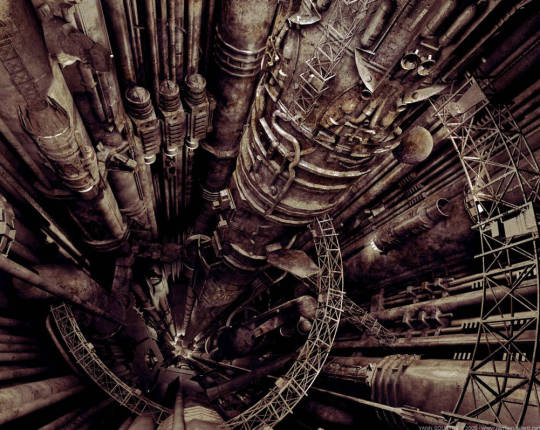
Monsters Reimagined: Grimlocks
Would it surprise anyone to learn that a d-list d&d monster has It's roots in 1800s ideas about eugenics and bad adaptations of genre fiction? No? Then you've been paying attention, top marks.
Asker is absolutely right in their assessment that there's not really much to grimlocks. They're one of many "hostile tribal primitives" that have filled out the monster roster ever since the original developers lifted them en mass from the pulp adventure stories they grew up reading.
A common theme among these pulp works and the early scifi that inspired it was devolution, the idea that a people could degrade from greatness back into an animistic nature. The most well known pop culture example would be HP lovecraft's deep ones, where the author's fears of race mixing manifest as monsters that literally push humanity back down the evolutionary ladder to the stage of fish.
There's plenty of different ways to explain the origin of this writing trend, but I like to chalk it up to an anxiety resulting from the widespread acceptance of Darwin's theory of evolution by a society that believed wholeheartedly in scientific racism. If intelligence (read: whiteness) wasn't just a god given right but was infact inheritable, then it could also be disinherited, bred out of a population whether by on purpose or by accident. This made it so important to practice good breeding (read: eugenics), to preserve the pure stock from falling to degeneracy (read: miscegenation) and introducing undesirable traits into the genepool.
We can see fear this with grimlocks, humanoids who were inherently lessened by their "adaptation" to life underground, losing their intelligence and eyesight and descending into a state of barbarism. Given that this is one of the few d&d monsters that mention evolution at all, we can trace this feature to their likely inspiration: The morlocks in H.G. Wells' Time machine, published a scant 36 years after Darwin published The Origin of Species.
I'm not well read enough to know whether Wells pioneered the idea of subhuman descendants, but I can say that most of his imitators missed the point of his writing: Wells saw in his day an increasingly indolent upper class inflicting brutal and dehumanizing labour conditions on the poor to support their own carefree lifestyle. He satirized this in his book by showing that while the descendants of the rich had devolved into beautiful, useless, idiots, the descendants of the workers devolved into subterranean ape-things who maintained the machinery that allowed the eden like existence of the rich while farming them for meat. Say what you will about Wells' race politics (Neither degenerate fop or inbred ape can withstand the smarts and strength of the enlightened colonial Englishman) but his writing was specifically class continuous, and the brutality of the morlocks was a direct result of the exploitation of working people in his own day and age.
When the morlocks were adapted into the grimlocks , the d&d writers kept their canibalistic streak but specifically removed their class based origins as well as their mechanical knowhow. This is a near identical process to what happened with a creature the worlocks helped inspire: Tolkien's orcs, which were likewise turned from a commentary on the brutality of the industrial age into warlike primitives. It's a bit of a trend.
If you wanted to "fix" the grimlocks I'd go one of two ways:
If you want to engage with themes of primality, make them legit underdark dwelling primates/australopithecus type of creatures, just figuring out tool use and language. Make the rumours of them being descended from cave-exploring humanoids a common myth made up by surface dwellers.
If you want to get spicy about it though, give them back their mechanical aptitude and maybe mix in a few more dashes of pulp "lost civilization" ancient aliens nonsense. Have them dwell in great mechanical complexes beneath the earth, worker drones who've long outlived the creatures that enslaved them and scribed mechanical knowledge into their very being. Originally denied understanding of the machines they toiled to build, work, and maintain, the grimlocks jealously guard the science they've spent generations reverse engineering, giving them the reputation of being violently territorial for those underdark travelers who venture too close to the megastructures they inhabit.
Artsource
#monsters reimagined#grimlocks#the orc dissertation#underdark#dnd#dungeons and dragons#d&d#ttprg#pathfinder
180 notes
·
View notes
Text
Varric and the Shakespearean Fool

How is Varric the most Shakespearean character in Dragon Age, and one of the most complex characters in the whole series? Varric fits the archetype of the Shakespearean fool, a character trope in Shakespeare’s plays that offers deep, cutting insights hidden behind a veil of comic relief.
The fool is an ancient stock character, but Shakespeare adapted it to create arguably his most sophisticated roles. He leveraged the fool as a vehicle through which an author can speak hard truths and thematic insights to not only the other characters, but to the audience. I think the Dragon Age writers use Varric in a similar way.
Varric is a bardlike, storyteller figure who often stands to the side of the main story and reflects on it. In Dragon Age 2, for example, Varric was responsible for framing the entire narrative. The fool is based on the court jester, and one of the primary functions of a jester was actually storytelling. Varric is known for his playful sense of humor, and he uses it to mask serious observations as well as provide comic relief. Shakespeare not only used fools to provide levity during tragic events, but also as truth tellers that reveal deep insights about the other characters and broader themes. Many of Varric’s nicknames for the companions reveal deeper truths about their characters. He calls both Hawke and Solas “Chuckles,” for example, which I believe is a nod to the tragedy and tragic irony that defines them both.
Shakespearean fools are such sharp commentators because they’re outsiders that exist in-between different social categories. Varric both figuratively and literally occupies liminal spaces in the world of Thedas. As both a surface dwarf and a second son, Varric is marginalized in dwarven society and within his own family. This position gives him an outsider’s perspective that makes him such an insightful critic. When we first meet Varric, he’s living in the Hanged Man pub. Not only is a pub a place for entertainers, it’s a liminal space that exists outside of the clearly defined categories of work and home. Adding even another layer, a “hanged man” itself is a liminal figure, suspended between life and death.

Another similarity is that fools are very close to powerful people, like Hawke, but they’re not bound by the same rules or expectations. This allows them to say things the other characters can’t. Fools challenge societal expectations and authority figures, and Varric frequently questions the status quo, using humor to mask his serious observations. He also engages in philosophical discussions, offering profound insights disguised as simple banter. Varric’s conversation with Solas about the man on the island is a great example of this. Through what seems like humorous casual banter, Varric is revealing key aspects of Solas’ character, and major narrative themes.
One of Shakespeare’s most famous fools is the fool from King Lear, who serves as the King’s conscience, offering moral insights and reflections that the king cannot. My friend Aisie pointed out that Varric will likely play the role of Solas’s conscience in the Veilguard, which is yet another way we’ll see Varric functioning like a Shakespearean fool. Fools are also known for pointing out hypocrisy or folly, and I think we may see Varric do that for Solas. There’s very interesting overlap between the themes in King Lear and the Veilguard as well, but that would be a whole separate topic.
Varric fits the trope of the wise Shakespearean fool so well it could be the subject of a longer piece of writing, but hopefully this is a good start. Let me know if you agree, and if you have any questions on how Varric will fill this role in the Veilguard!
#dragon age#the veilguard#dragon age the veilguard#varric#varric tethras#dragon age varric#dragon age 2#veilguard
61 notes
·
View notes
Note
I'm not sure where I saw it but there are a few references to classes and teachers (like in the character book where they have subjects they're best and worst at, in a few chapters where they reference "class/es", and in an interview with satoru nii, I think, though I can't find it) – the Reddit pinned post for the manga is ood for the interview where they talked about it. In the interview, it sounded like they said it was just a pragmatic thing; the story follows the action, so there's not really any need to flesh out the school side of Furin, but that could have just been a deliberate obfuscation. I hadn't really thought about it (generally, I don't care to, because that side of fandom can get really condescending and form echo chambers of "no one else is thinking about this right or as much as us") but I found your thoughts interesting to read and thought you might have wanted to know about the teacher thing, because even if teachers are there, they haven't been included in the main story at all, and don't seem to be trying to teach them anything beyond the academic curriculum.
Thanks! I had seen that, but I try to mainly base my analysis on what's in the text itself ("the author is dead" and all that). However, I appreciate the input and I actually do have some related thoughts on this.
By the way, if you or anyone else seeing this post can tell me any specific chapters where the Furin kids talk about school stuff, please share! I totally missed any mentions of that, so my views below are all based on the assumption that the kids never mention anything school related.
A few messy thoughts:
I accept that the Furin kids do go to class, but to your point, their teachers seem ineffectual at best (and, as I'll get to later, extremely trusting). I figure that anyone who'd teach at a delinquent school notorious for year-round fighting is probably not great at their job. Before Bofurin, I imagine the teachers had all given up any hope of teaching anything and just tried to survive. Ever since Umemiya took over, they've probably been so happy to finally have some peace that they just let him and the other kids do whatever they want.
While I try not to speculate too much about authorial intent, it often feels to me like Nii has challenged himself to take as many stock tropes as he can and to use them as effectively as possible (or maybe he's just a really good writer using a lot of stock tropes lol). For example, Sakura is a classic tsundere, but it's actually rationalized in a really compelling way by his characterization. Likewise, WBK also takes the trope of invisible teachers and actually fits it into the broader themes of the story (as previously discussed in the post you're referencing).
I kinda wonder if Nii was forced to show the protagonists going to high school in order to be published, and thus chose to do it in the most cursory way possible. It kinda feels like the story was meant to be told with a cast of young adults, but maybe Nii or the publisher felt like it'd sell better with teenage protagonists in a school setting. I also suspect it would be controversial (and understandably so) to publish a series aimed at teenagers where the teenage protagonists choose not to attend high school, so I've thought the whole invisible teachers approach could be a workaround for that.
That said, the absence of teachers (and any other responsible adults) just feels so conspicuous that it's hard to write it off as purely pragmatic. Plenty of series have seemingly nonexistent teachers, but they usually avoid showing kids in settings where teachers would appear. WBK could have easily done that (e.g. by giving Bofurin an HQ near the school where they spend all their time), but instead it practically goes out of its way to rub the school setting in your face. For that matter, Nii also could have chosen a different setting where kids wouldn't have to attend school at all, but he explicitly chose to set WBK in what is very clearly present-day Japan. I don't think it's worthwhile to speculate about what Nii "really meant" by this (or if he really meant anything at all), but from an analysis point of view, this is just too conspicuous for me to ignore.
A theme in WBK that I'd like to explore in-depth at some point is trust—namely, how WBK challenges us to imagine trusting these so-called delinquents who are rejected everywhere else and to imagine that they might make their world a better place of their own accord. The absence of visible teachers really highlights this trust. The kids have been given free reign of the school to do whatever they please but, despite adult authority figures being functionally nonexistent, they've still managed to turn it into a better place.
Lastly, while I have to admit I probably fall closer to that "no one else is thinking about this right or as much as us" side of fandom than not, let me just say: fuck anyone who's condescending about it. I personally enjoy deeper media analysis and am trying to cultivate more of it around WBK in my own way, but everyone is allowed to engage with media how they want. The angle I'm trying to take is more "Hey, here's this neat thing I noticed!" as opposed to "You're enjoying this wrong." and I hope that others will do the same.
#wind breaker#windbreaker#wind breaker manga#windbreaker manga#wbk manga#wind breaker satoru nii#satoru nii#wbk#wind breaker spoilers#windbreaker spoilers#wbk spoilers#wind breaker manga spoilers#windbreaker manga spoilers#long post#rambling#mine#asks#anonymous
34 notes
·
View notes
Text
Okay I read unofficial translations but of course I bought the official translation of Thousand Autumns and I just gotta say - does anyone else think Yan Wushi’s entire battle with Hulugu was a setup?
No, not like he was faking the duel and set something up with Hulugu. I mean he KNEW he could defeat Hulugu and the only question was how badly he’d be hurt in the process. Like if he’d be walking it off or if he’d actually collapse. Even that, he had a pretty good idea of how it would end.
Because rereading the whole series, once he becomes determined to win over Shen Qiao, Yan Wushi’s already confusing personality becomes even more misleading now that he knows he’s teasing Shen Qiao into the inevitable. We’re stuck primarily in Shen Qiao’s mind, and whenever we get a glimpse of Yan Wushi’s mind, it’s almost always to say "He was saying this, but actually he felt this and was having so much fun seeing Shen Qiao be so easily tricked." Once you’ve reread his actions multiple times over, you realize...like, he knew.
He knew he would beat Hulugu. Whether it was because of the power of love or just because of his own arrogance, he never went into the battle thinking he might lose. Any and all of his suggestions that he might actually die were for Shen Qiao’s sake, to taunt the man into realizing that he was worried about Yan Wushi - to actually admit he didn’t want Yan Wushi to die.
He joked about making bets only when he didn’t know the outcome because that was the only way things were fun, which may have had some truth to it, but then he also set up the massive betting pool to not be in his favor so that when he DID win, he ended up getting a massive payout. Like we call that illegal in our modern day, like manipulating the stock market.
Yan Wushi has been a terrible pessimist and misanthrope since he was very young. He has never trusted anyone (until Shen Qiao) to ever do something honorable or noble when they thought they could control him. Therefore, Yan Wushi very rarely EVER goes into anything without knowing his odds and his escape plan even when if he does fail (see the epilogue story "The Past" for an example). I think the only time he really bet his life was the 5-1 fight where he genuinely didn’t think Shen Qiao would survive his betrayal, let alone rush to his side to save his life.
Compared to that, even against Hulugu? Pfft, it sounds like he's just playing with Shen Qiao from the very beginning.
He announced his challenge when Shen Qiao went to Xuandu Mountain - implying it's for Shen Qiao’s sake, tugging at his heartstrings.
He tells or lies to Bian Yanmei to convince Shen Qiao that the flaws in his demonic core haven’t healed and his battle against Xueting weakened him. Oh no! Now Shen Qiao is even more worried! (Shen Qiao can’t tell just by taking his pulse alone, mystery, is he really okay???)
This also makes us all completely gloss over the fact that both Yan Wushi and Shen Qiao had gained access to the final volume of the Zhuyang Strategy thanks to Xueting’s defeat - if we count them battling one another as exchanging the volumes they never see in person. The Zhuyang Strategy. You remember that thing? That thing whose true qi kept Shen Qiao alive after getting poisoned and beaten to near-death on numerous occasions? Just that thing, no biggie.
Yan Wushi denies both of the former points and says "No I challenged him for my own amusement actually, it has nothing to do with you, and also Bian Yanmei doesn’t know what he’s ralking about I’m fiiiine see?", but Shen Qiao thinks he’s downplaying or lying to spare his feelings - something Shen Qiao would believe he’d do only if he believed for a second that Yan Wushi DOES in fact care about him.
He takes Shen Qiao out gambling to further emphasize that he enjoys leaving things to fate (making us *Shen Qiao* forget the fact that he’s a meticulous planner and intelligent strategist who puts the odds in his favor and always gets what he wants even when he loses). Funny detail that Shen Qiao was (unintentionally or not) rigging the game so that he won, because his natural personality likes having control over things even if his entire journey losing his power demonstrated that he’s very competent at just dealing with misfortune without overreacting. Though they believe different things, the two really are cut from the same stubborn cloth.
Yan Wushi also makes Shen Qiao see the gambling dens where people are betting against Yan Wushi, thanks in part to a certain Yi Pichen’s comments on the matter. Shen Qiao is NOT having feelings or anything, what are you talking about, he’s not worried about this guy he absolutely does not feel attracted to, but uh...those people don’t know you well enough to place their bets correctly, am I right?
Yan Wushi KOs Shen Qiao to make him miss most of the fight to terrify Shen Qiao into thinking he might MISS Yan Wushi’s potential death match, oh no! Come on, I don’t believe Yan Wushi wasn’t skilled enough to have precisely sealed his sleep accupoint or whatever so that Shen Qiao has JUST enough time to catch him near the end of the duel.
Yan Wushi was definitely injured by Hulugu, there’s no denying it. Even when he fights other powerful characters, he’s not a Mary Sue, he still does take damage and admits that he has to push himself to actually kill other grandmasters like Yuan Xiuxiu. However, after the battle with the 5 guys, Yan Wushi absolutely knew his odds and how much it actually takes to crack his skull open. He also knows that Shen Qiao has seen him nearly dead before and will absolutely be using that to freak him out further and convince Shen Qiao he might actually be dead.
He probably DID need Shen Qiao’s medicinal pills to help him, but Yan Wushi was basically guaranteed to have survived and just waiting for Shen Qiao to say he’d "Do anything" before he woke up again. Like does that not sound like a Yan Wushi thing to do? I’m half convinced he stopped his own heart and breathing with a technique (there’s a turtle-breathing technique in the Donghua, something like that to fake it for JUST long enough for Shen Qiao to freak out) or was planning to do so if Hulugu didn’t manage to fuck him up enough for it to be convincing.
The fact that he’s still able to joke around kissing Shen Qiao then loudly complaining about how much pain he’s in automatically tells us he’s not doing as bad as when his head got cracked open. He’s fiiiine.
Then we get the gambling reveal where Huanyue Sect made a few casinos go bankrupt and he sends a fifth of it to Yi Pichen and the Chunyang Monastery as a thanks for essentially rigging the bets.
Yan Wushi tells Yu Shengyan that Shen Qiao already loves him, he’s just too prideful to admit it, and then later sets up the whole scenario in the epilogues - YES IT'S ALL A SET UP - just to get Shen Qiao to have the courage to confess.
In conclusion, Yan Wushi knew what the fuck he was doing, he fought Hulugu primarily to fuck with Shen Qiao and just also happening to get some other things out of it too on the side. Ya boi wanted to force Shen Qiao to realize how much he cares about Yan Wushi in return. And kill a bitch while earning some street cred, but that’s beside the point.
I had no pictures to add for this rant, maybe I’ll add them later, it’s 2am thank you for coming to my Ted Talk.
#thousand autumns#qian qiu#qianqiu#shen qiao#yan wushi#yanshen#meng xi shi#thousand autumns vol. 5#long post#rant#he's a magnificent bastard#he's also a child being like “You say you hate me but you'd miss me if I died”#“bet you’d cry if I died”#“you said you'd do anything?”
61 notes
·
View notes
Text
year-end sugar rush round up 🍭
it’s time for the last round up of 2023. we have made it through another year filled with clownery and love for the boys! as per my tradition in posting year end candy recaps, i am releasing early 31st cause i am gonna be busy with nye shows. i hope you enjoy looking through all the happiness the final month gave us. have a great new year’s eve everyone!!!
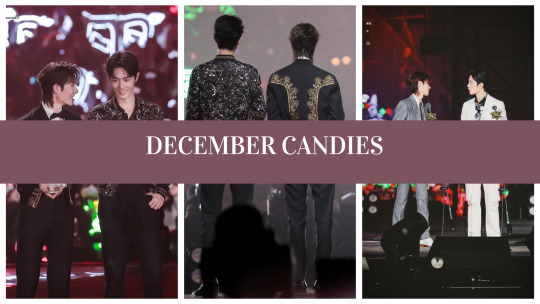
if you wanna look through the past months or year/s then go to this link. 🔗
i’m adding a little exercise to this post tho and ask you, what are your top 5 cpns of the year? please comment or reblog with your answers!
• The tattoo rumor resurfaces ( new clue? )
• Bowing to the crowd as thank you
• 13 fake rumors - from the vault
• potential wedding photoshoot and “superman can’t fly”
• not really cpn but a media account on tiktok posted a video of xz’s appearance in MBS. they used the tags related to xiao zhan for more views, but they included one that has wang yibo’s name on it. 😂 i know that they might have just chosen an already existing tag with xz and wyb name on it and forgot to edit it. but it’s still a funny incident.
• 12/3 ZSWW Fake Rumor ( pre singapore timeline )
• 12/4 fake story contribution ( wolf mates for life )
• Washing candies only make it sweeter
• An example of bjyx being an open secret ( sort of )
photos were going around of a yibo vcr played in a chanel annual meeting in china. we were all happy to see wyb lookin so good and fresh faced, but what we noticed is his top.

the style of top he was wearing (p1) is very similar to that of GG’s (p2) at the airport when he was flying back to Beijing. it’s probably because the weather is getting colder so they wear this instead of their usual esspensive t-shirts?
the point is it’s kind of like the same-style in a close timeframe from each other. so it seems like their tastes in casual clothes are still very close.
• 12/7/23 Candies ( GQ MOTY + XZS Singapore vlog)
• The GQ MOTY hat was a gift from XZ 🤍 // Part two : I have to say that this has become a favorite one among cpns and has become notorious since so/os from both sides are trying so desperately to wash it. those on xz’s side using rocco’s 227 kadian to dispute everything even if it was their fault they were called out while xz was busy working his ass of shooting LOCH. this is just a reminder that the celebrity is not equal to their fans. whatever drama both sides do to each other, has nothing to do with us and does not reflect the boy’s relationship. 🤍
• Coffee from Singapore CPN ☕️
• All the things that happened Monday Morning of 12/11 which includes the magazine covers, pants, xz going online for a moment etc.
• xiao zhan’s snowman ⛄️
• The fact that WYB was wearing the bone necklace tho hidden during his BAZAAR photoshoot. The ones in focus were of course Chanel, but those who pay attention will see it. A proof of how special it is. Imagine WYB being bare faced and only had stuff that he actually needs, and he decided to keep the necklace on.
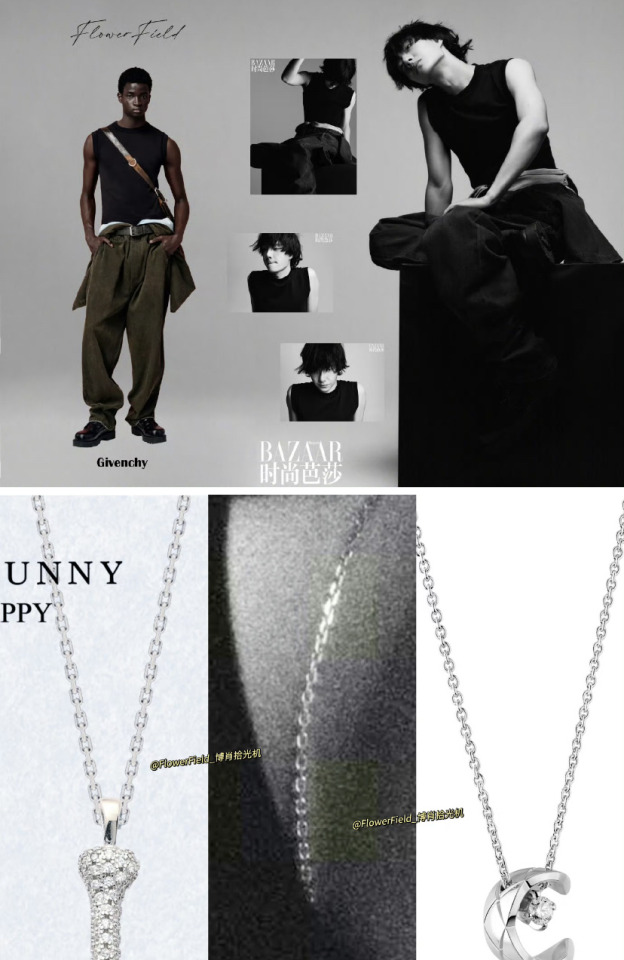
• Not exactly CPN but more of a similarity i love to see. cause Shandong Satellite TV decided to air BAH right after SBMS! We love to see their works not only be shown in online platforms, but also in satellite TV stations.
• Candy Throwback : Alexander Mcqueen shoes, Nike off white & WYB’s missing mole
• 12/15 double attack of stock photos from XZS and YBO. The black and white theme! Anytime these two decide to give us some update is a happy day!

• Du Hua describes WYB’s looks as that of a rabbit
• Tencent Video All Star Night CPNs 💛
• 12/19 they both went back to Beijing. ZZ was in Shanghai to film and WYB also filmed CCTV stage. The thing is WYB started filming at 2:00 AM and then he was back at the airport to leave at 10:00 AM. They both arrived to BJ so close to each other. CPN is they tried really hard to be back home & be together that day ♥️
• throwback cpn : wyb prepares xz’s room in hengdian (2021)
• their studios posting so close together for winter solstice! tho wyb’s is a preview for his new single, ybo still greeted people.

• Winter solstice CPNs ( WYB’s song preview and GG’s photoset )
• Clowning about a possible secret message from a 9key code
• ��Everything is lovely” similarity from xzs caption and yibo’s new single and more clues like a possible connection to an lrlg post & what looks like a rabbit and character for ox.
• black and yellow similarity!

• 12/26 WYB EP cpn post ( teaser lyrics )
• FAE : Free and Easy sweater
• Same style of editing between XZS and YBO who we all know are dating ☺️☺️☺️

• 12/28 candies
• Marie Claire x Xiao Zhan issue 🍭🍬
• Yibo’s new singles : Bystander & Everything is Lovely
• LRLG 12/30 translation and short commentaries
• LRLG responding to cpf comments
• Wang Wang Xianbei 😂😂😂😂
• Similar clothes and Participating in the same single for a nye song
That’s all for now, See you next year!!!! ❤️💛💚
122 notes
·
View notes
Text
Sherlock and Shoscombe
So, after the deep dive I did with Sherlock & Co and the issues with the Case of Identity storyline, I thought it was only fair that I talk about their take on The Adventure at Shoscombe Old Place.
*Ahem*.....This was a lot of fun! I just looked up a summary of the original story because I didn't remember it well, and no wonder! It was the very last Sherlock Holmes story Doyle published, later collected into The Casebook, and thus...one of the boring ones. I'm sorry. I really don't like The Casebook stories. It's also the last batch of stories that the Doyle estate was clutching onto before Sherlock went fully into the public domain, which makes the story feel doubly tedious to me.
But! These episodes were a blast! Practically a survey of all the best parts of Sherlock & Co! There's fun banter! Heaps of character background! A really clever update to the original set-up! BRILLIANT acting and foley work! A cheeky cameo! And a truly exciting, satisfying end! I think this is the most direct information we've gotten about John's past since, well ever, but certainly since we learned about his memories of his dad. Now we know that he grew up in a very class-divided town that once felt so much bigger. And he was deeply in love once, with a woman he lost partially because of classism. (Which is such a great mirror for Beatrice and her husband's situation!) He also lost his friends because they had privileges he didn't. (Did John join the military partly as a way to get away from his roots? Out of a desperate need to be praised as a hero?)
No wonder John has so much resentment for the wealthy when it's so deeply personal. I think it's going to be comically awkward and VERY interesting when he finds out that Sherlock is mega super rich. Holmes is often theorized to be the son of a lord in canon. I figure he's at least from a wealthy family that was able to pay for him to go to tons of fancy schools. And then personal tutors. And a full-time staff that always took care of cleaning and stocking up the groceries. (For all his observation skills, I do think Sherlock grew up never considering who made his household run.) I think part of why Sherlock has been so touchy about John's anger at rich people is because Sherlock is SUPER nervous it would ruin their friendship. I am also so pumped to see what the podcast does with Mycroft! I wonder if his autism might be more limiting than Sherlock's. Like he's got the genius skills, he's got the deceptively powerful government job, but he can't handle going out into the world. Going to Baker Street would be an ordeal. Might have a full meltdown if he's not at home, work, or whatever the Diogenes Club is updated to. But.....It's hard to tell how much Sherlock & Co wants us to suspend our disbelief about some things. John and Sherlock have very clearly committed a LOT of crimes on their publicly available podcast. Maybe that will never be addressed or MAYBE Sherlock, Mycroft, or other Holmes allies have been bribing and intervening to keep them from getting arrested. Imagine the drama! "You hate the rich, but you owe all your success to MY money and power, 'Dr.' John Watson!" *Blinks rapidly*
Where was I? Oh yeah, Shoscombe. That. God. Damn. Chase. Scene! So bold for a podcast to have a climax with a car chase at the center. The foley work was top-notch for the driving and the terrain and then the crash and sinking in the lake. Whoever plays John Watson, you did an incredible job! The reckless car chase where, OF COURSE, he still narrates everything, the diving for Robert (and the clever layer of the recorder fritzing), and that CPR! It was all so engaging and believable! I love when John does doctor stuff generally, but this was my favorite example since the gunshot wound at the wedding with The Solitary Cyclist. Not sure I buy Robert's at-home crematorium as being 100% good, but I can believe John thinks so. Might help that John's a bit more desensitized to cutting into corpses than most folks. Finally, I'm sure folks are quite excited that a certain James made a cameo. (Maybe he's interested in why Sherlock and John keep getting away with all their crimes.) I knew he was going to show up at some point, and making Moriarty a listener shout-out is delightful. I just hope it's a while longer before he's ON the show. It always frustrates me when Moriarty winds up becoming basically Lex Luthor. Then again, we've already had similar cameos for Irene Adler and Baskerville Hall (and probably some I've missed) without them showing up yet. We'll see how it goes!
Good job, Sherlock & Co! I'm excited to see what you do next!
44 notes
·
View notes
Text
No, George Lucas is not a "traitor"
You may have seen angry tweets and thumbnails such as these, in the last few days.


Context - Disney is going through a proxy battle, and George Lucas sent out a statement that read as follows:
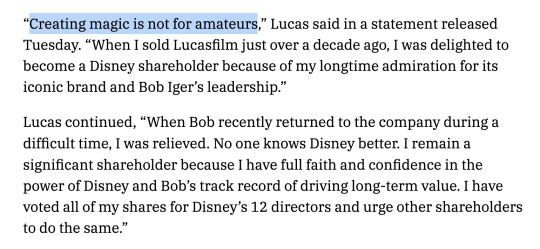
So immediately, all the grifting influencers who based their entire platform around the narrative that "Kathleen Kennedy & Disney betrayed Lucas' legacy" banded together and agreed that the new line was:
"Fuck George Lucas, he betrayed us and betrayed himself. Lucas sided with his own abusers!"
Here's why this line of thought is absolutely childish and uninformed.
1- Get real, he's a shareholder, of course he'll say this.
I don't need to expand on this, do I?
He owns stock. Someone threatens your money, you defend the money. The question becomes: why does he think that sticking with Disney CEO Bob Iger will result in more profit than siding with?
Variety theorizes that it may be because Nelson Peltz has admitted that he has no media experience.
And if that's the case? I'm not surprised at all, because...
2- George has always hated amateur studio execs
The following is me simplifying a lot... but George's relationship with studios has never been a good one.
When he was working at American Zoetrope, with Francis Ford Coppola, they were commissioned to adapt George's short film into a feature, THX-1138. The studio execs didn't like it and forced Francis to refund them the money (which is why he agreed to direct The Godfather, to get out of debt).
Moving on to American Graffiti (1973). When George writes Graffiti, he shops it around to studios and they all essentially told him to go fuck himself.
"American Graffiti went around to every single studio twice and they all said, "It's not a movie, there's no story, and there are no movie stars in it." And Star Wars— it was, "What in the world is this? Wookiees and robots? I don't get it." [...] It'd be hard to make a movie [like American Graffiti or Star Wars] today in the system because all these middle management people get in there and interfere in the process. I think that's much worse for filmmakers than it's ever been in the past." - Star Wars Insider #43, 1999
Except Universal. But throughout the process they're being irritants.
They object to the title because they don't know what it means.
The president is convinced it's a bad movie to a point where when he sees audiences cheer for it in test screenings, he argues they're paid actors.
They force Lucas to trim 5 minutes out of the film. Why? Just because.
This approach the studio execs were taking comes from the fact that none of them were artists. At this point in time, studios had been and were being bought by corporations who thought they could make a quick buck in the movie business.
Eg: Warner Bros wasn't run by the Warner brothers anymore. Paramount was now a subsidiary of Gulf+Western.
So when he's receiving notes, they're coming from - you guessed it - amateurs who think they know what they're talking about, but in reality have no clue. They did market research and think they know everything.
This subject is covered in The Offer (2022), a series about the making of The Godfather (reeeeally good show, I watched it twice).
In this scene, for example, you have a studio exec with no artistic sense whatsoever trying to tell Coppola which poster he should go with, and you get the idea of what I mean.
youtube
(Fun fact, a young George Lucas even makes a cameo in the pilot episode, in Coppola's office.)
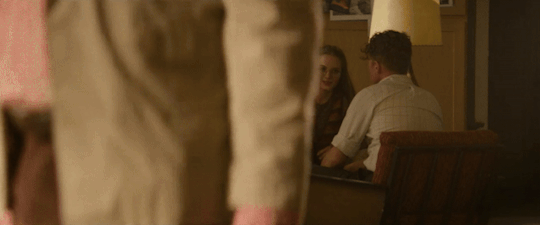
George also went into this subject during his 2015 interview with Charlie Rose.
It's a 4-minute clip, so here's the relevant bit:
"[Big corporations are] known for being risk averse. And movies are not risk averse. Every single movie is a risk, a big risk, like... The movie business is exactly like professional gambling... except you hire the gambler. You use some crazy kid with long hair, you give him $100 million and you say "go to the tables and come back with $500 million." That is a risk! Now, the studios have been going to think of it that way, they say: "well, maybe if we told him that he couldn't bet on red, maybe if we told him because we did market research and we've realized that red wasn't" -- so they tried minimize their risk. [...] They're basically corporate types. They think-- some of the worst things happens when they think they know how to do it, then they start making decisions that ensure it's not going to work. " - Charlie Rose, CBS This Morning, 2015
Now, ironically, this is the same interview in which he compared Disney to "white slavers", but clearly he was still smarting from his own ideas for the Sequels having been ignored.
But considering how little a fuck he gave about those Star Wars films once they came out and how often he visits the now visits sets of like Ahsoka and The Mandalorian, I think he's over it.
Again, this doesn't align with some Star Wars influencers' narrative that "he's fuming, he hates these movies, he feels betrayed and angry!" But if you ask me, he likely couldn't care less, and dubbing Disney his "abusers" is giving them waaay too much credit.
He made his movies, told the story he needed to tell and is now probably just enjoying his retirement, raising his daughter and putting together his museum, part of which is possible because of the money Disney keeps generating for him, as an investor.
So it doesn't surprise me one bit that George Lucas, of all people, to side with the Devil he knows rather than the amateur exec, because the latter is a painful road he knows all too well.
70 notes
·
View notes
Note
Hiii, I hope you're well.
As far as I understand, the idea/debate of whether Alexander and Hephaistion were lovers goes back centuries. As far as I know, it was the roman writer Klaudios Ailianos in 'Miscellaneous History' who first called them lovers.
But how did it come about? Did it come out of nowhere? Why exactly did some Roman writers consider this possibility, that they were lovers?
Alexander and Hephaistion in Roman-era Authors
We’re not actually sure who first (unambiguously) called them lovers. Aelian’s comment postdates one in Arrian’s writings on Epiktatos, which also claims it, not to mention the not-so-subtle hints in Arrian’s biography, where Hephaistion is compared to Patroklos (the only Alexander historian who makes that comparison, btw). Arrian was probably dead before Aelian was born. Similarly, Curtius implies it in his history, as well, although it may not be meant in a good way, there. Curtius is (probably) even earlier than Arrian.
We must remember that Alexander was an object lesson by the Roman era—mostly as a cautionary tale, but sometimes for good, too. That lent itself to oversimplifications. Seneca uses him to talk about uncontrollable rage with the murder of Kleitos, and excessive mourning with his reaction to Hephaistion’s death. He was also used to warn against overweening ambition and Too Much Drink. In short, all examples of “excess,” which was a big Roman no-no, and a Greek no-no, too. Sophrosunē (self-control) was much lauded; so also Latin disciplina. Plutarch presents the young Alexander as a shining example of sophrosunē, thanks to his Good Greek Paideia (education). But success spoilt him. While not a Roman, Plutarch lived under Roman rule and was part of the Second Sophistic—as was Lucian, who’s even more harsh towards Alexander. His “Dialogues of the Dead” includes one between Philip and Alexander where Alexander is presented as a pompous ass. There’s another dialogue just below, between him and Diogenes, which is more of the same. ATG comes out better in the dialogue with Hannibal and Scipio (and Minos).

But all that gives you some idea of how Alexander was used as (negative) exempla. Plutarch in his “On the Fortune or Virtue of Alexander” goes the other way and presents Alexander as Ubermensch. It was a standard piece of rhetoric from Plutarch’s youth, so shouldn’t be taken as his opinion on Alexander. He was showing off his speech-writing chops.
This is how Alexander was used by the imperial period and why certain anecdotes about him were repeated over and over. Hephaistion wasn’t remembered as Alexander’s chiliarch and right-hand guy, but as Alexander’s beloved friend and alter-ego: Alexander too. The story of Hephaistion and Alexander before the Persian women was quite popular, popping up again and again, sometimes to show Alexander’s generosity but sometimes to show the vicissitudes of fate (Oh, how the mighty have fallen). The nature of such anecdotes is their very malleableness. They can be used and reused to make several different points.
Hephaistion wasn’t unique. All the bit-players around Alexander came to symbolize something for stock usage. And the move from dear friend to lover isn’t a big one, in the game of ancient rhetorical telephone. 😉
It may also reflect reality. But that entails determining whether it’s the removal of prior coy language, or exaggeration for rhetorical purposes. That���s not at all straightforward.
Greeks were somewhat reticent on certain matters, and “Friend” could have romantic overtones in the right context. It’s the problem of “When is a cigar just a cigar?” Ha. In this case, when they met would have a lot to do with it. Were they indeed friends from their youth (as Curtius claims)—or only later, once Alexander was already in Asia (as Hephaistion is never mentioned in our sources about Alexander’s youth)? That’s why Sabine Müller thinks they didn’t meet until Alexander was an adult, and Hephaistion came from Athens, wasn’t just of Athenian descent. They would have met too late to be lovers, although Hephaistion was still very dear to Alexander and a perfectly capable commander (on that, we agree). By contrast, I do think they met as boys, and were lovers, and that attachment persisted into their adulthood (although perhaps not the physical affair). And that comes down to which sources we trust, and why: the historiography.
#asks#Alexander the Great#Hephaistion#Hephaestion#Aelian#Arrian#Curtius Rufus#Lucian#Second Sophistic#Greek rhetorical writing#ancient rhetorical writing#ancient rhetoric#Alexander as exempla#alexander x hephaestion#Alexander x hephaistion#Classics#historiography#tagamemnon#ancient Greece#ancient Rome
37 notes
·
View notes
Text
I'm so obsessed with stories that boil you like a frog. Stories where you take stock of the situation and suddenly realize how out-of-hand, uncomfortable, tense, etc. things have gotten without you even noticing the gradual escalation. It's like the horror equivalent of a slow-burn.
Shirley Jackson is a master of not just that, but at using moments of noticable escalation for maximum impact. She's also really good at making you uncomfortable without you even really knowing why. The Summer People is my favorite of her short stories because the tension ratchets up gradually and almost inexplicably. It's about a retired couple who decide to stay in their summer house a little longer than usual
The Auctioneer by Joan Samson is a great example of a novel that does this. It was published in the 1970s and was kind of a forgotten classic until Grady Hendrix profiled it in his nonfiction book Paperbacks from Hell. That's where I learned about it and it doesn't disappoint. It's a stranger-came-to-town story centered around a community auction, and it's genuinely scary how A leads to B leads to C and soon the unthinkable is happening.
A more recent book that does this really well is Hawk Mountain by Conner Habib, it's a slow build to some really dark and weird places that all starts with a man trying to reinsert himself into an old aquaintance's life. (There's some content in here that may not be for everyone, feel free to ask me for details).
Anyway, I just love this kind of story and wanted to hilight some of my favorite examples!
16 notes
·
View notes
Note
do you have any tips on how to get better at showing, not telling when it comes to descriptions in stories? i really struggle with describing characters without blatantly telling you what their features are especially. i always find myself reverting back to telling without realising it. thanks!!
Our post in the Reading Room today is all about showing, not telling, and includes these great writing exercises to help you improve your skills!
Writing exercises to show, not tell
Picture this!
Using a random picture (it can be anything from a stock photo, your favourite painting, or a book cover you like), describe what it shows without explicitly stating what’s depicted.
This isn’t an easy task, but it’s a great challenge to get you to start describing things without stating the obvious. It’s a good way to practice giving readers a sense of things and really putting your imagination through its paces.
Let me give you an example below:
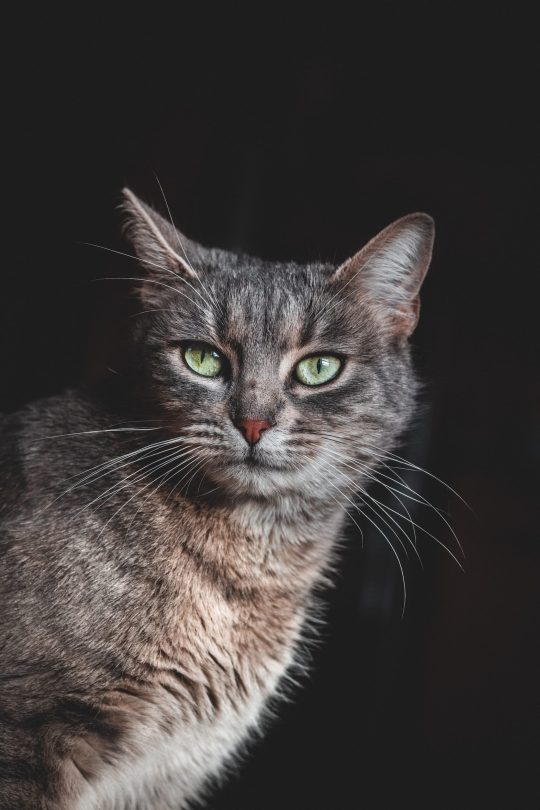
With a regal bearing and a piercing green gaze, she stands before the void in feline judgement.
Sensory immersion
Choose a familiar setting, like a coffee shop, a park, or a favourite restaurant. Spend a few minutes observing your surroundings, paying close attention to the sensory details, then write a descriptive passage that never mentions exactly where you are.
Focus on sensory details and illustrate what is happening around you. Share this passage with someone who is also familiar with the place and see if they can tell where you’re writing about from description alone.
All about action
Take a character from one of your stories or create a new one. Write a scene where the character experiences a strong emotion, such as joy, anger, or fear. Without explicitly stating the emotion, write around it using action only.
You can use body language, facial expressions, and gestures but avoid using anything (synonyms, for example) that will give away the emotion. Show it to a trusted writing buddy and see if they can guess the emotion you’re trying to convey.
Talk it out
Write an exchange between two characters where they are having an emotionally charged moment. You can use a character you’ve created, or use two characters from a favourite book or TV show that you know well. As long as you have a good sense for who they are and their back story.
The exercise is to avoid directly stating the emotion each character is experiencing; instead, use tone of voice and word choice to illustrate their emotional state and convey their thoughts and emotions indirectly.
Narrate your day
This one is super fun, but be warned, if you do it in public, people will think you’re a little odd. I’ve done it before, and it resulted in some hilarious real-world interactions, but just be prepared. Some of you might prefer to only do this one when you’re alone.
The task for this is to narrate everything you do for a day. Using the recorder on your phone, dictate your actions, your thoughts, and your feelings. Going for a walk? Talk about where you’re going, what is around you, how things feel under your feet, and what the weather is like. What other things are you thinking about on the walk? How are you feeling? Not just in the moment, but what is going on in the back of your mind?
At the end of the day, listen back to everything you’ve narrated. Take note of what sticks out. When I did this exercise, I found that the emotions I thought I might be feeling in any given moment were often not the ones that I was actually feeling. For instance, I’d spoken with my family earlier in the day, and there was a sense of homesickness that wormed its way into every other moment of the day, from my interactions with others to my mood before bed.
An exercise like this can really help show you how to use subtext to show, not tell.
Remember to approach these exercises with an open mind and a willingness to experiment. The goal is to practice and refine your ability to show rather than tell, not to generate a world-class piece of prose that you’d immediately want to include in your next project.
#writers#creative writing#writing#writing community#writers of tumblr#creative writers#writing inspiration#writeblr#writerblr#writing tips#writblr#novlr#writer things#show dont tell#showing not telling#descriptive writing#writing exercise#writing exercises#writing prompt#learn to write#helping writers#writing resources#creative writing resources#writing advice#writer#writers helping writers#how to write
296 notes
·
View notes
Note
okay, asking this question is maybe the dumbest i've ever felt bc it feels like there should be a straightforward, obvious answer here, but every time i've tried to look it up, i've found nothing but pages upon pages of what feels like people talking in circles and only serving to make me more confused in the end. since you're the most knowledgable person i follow when it comes to the Classics, i figured this might be a good place to ask and maybe get an actual answer? (that being said, it's fine if you don't want to/don't have the time to answer this! obviously!!)
where can i read about the older greek myths? as in pre-trojan war. mostly, i'm interested in theseus but also just pre-trojan war stories in general. i know not everything got the iliad/odyssey treatment and there's probably not any surviving text to point at in a lot of cases, but there must've been something. every time i try to look up where to read about the history of theseus, i'm being directed to a bunch of modern retellings, but google has gotten so bad as a search engine, i literally cannot find anything about the origins of this thing everybody's retelling
from what i understand, theseus was sort of everywhere sticking his nose in everything at all times, so i'm not asking for a comprehensive timeline of his whackass life and everything he ever appeared in or anything, but if you could point me in the direction of anything about him--actual plays or academic texts, anything like that--that's more credible than, like, a self-published, self-described "bold new reimagining" with a stock image of a dude in party city roman cosplay as the cover, it would be MUCH appreciated 😭
(again, sorry about how... basic this question is i guess lol? i'm very new to classics in general and still pretty ignorant about everything, so it's EXTREMELY likely that this is a very dumb question with a very obvious answer, but thank you regardless!)
Hello! What an exciting ask (and apologies for my excited and maybe incoherent answer)!
Since you seem to be most interested in Theseus, I’ll use him as an example but much of this can be applied to other Greek heroes/myths/stories more generally.
As you noted, few get the Iliad/Odyssey treatment. In fact, even Achilles and Odysseus don’t, considering the Iliad spans only 7 weeks or so, and the Odyssey misses out on Odysseus’s actions before and during the Trojan War, and after he came home – and he did a lot after he came home. So where to go to find all the other stories that happened?
Some things to keep in mind:
Writers assumed their audience was familiar with the hero’s greatest deeds already
The big boys – Achilles, Odysseus, Theseus, Perseus, Heracles, Oedipus – had their stories shared in many formats. Think of the Parthenon metopes, which show Theseus’s key deeds in sculpture, or vases, hymns, public performances, bedtime stories, etc. People would encounter these often enough that the outlines of these heroes’ stories were known to them from a young age.
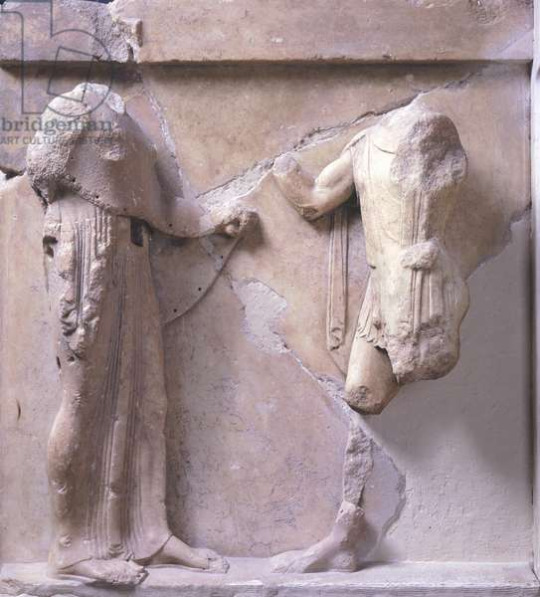
One of the Metopes of the Parthenon, showing (probably) Athena and Theseus.
As a result, ancient texts never show the entire story; they select the moment they want to tell and focus in on that. Hence the Iliad focuses on Achilles’s wrath, the Odyssey emphasises his homecoming, and the Argonautica tells the story of the Golden Fleece. Similarly, tragedies will choose a meaningful moment: not all of Agamemnon and Clytemnestra’s struggles, but his return home in the Agamemnon, or the events that lead directly to Pentheus’s dismemberment in the Bakchai.
So finding one text that will give you a useful overview will be hard!
These heroes are often also connected to so many other famous characters, that sometimes they show up as a side character in their stories, so it depends on which stories capture your interest most.
Pre-Homeric texts are few and far between
But this is not to say there aren’t pre-Trojan-War myths!
There are loads! Anything with Heracles or Theseus is pre-Iliadic, and others, like the house of Pelops, link more to the Trojan War but are also separate from it. Plus, there is Hesiod’s Theogony (roughly contemporary with Homer), which tells of the births of the gods and goes all the way back to the start of the universe.
The Ovid situation
Many Greek texts are lost, and we’ve only got allusions to this or that part of the myth in the existing fragments, etc. etc. So how do we still know so much about so many of these stories?
Enter my fave: Ovid.
Far later than Homer (1st century versus 8th century BC), but with access to all the Greek texts and them some, he wrote a lot of fairly comprehensive stories. These include the Heroides, letters written from the perspective of female characters trying to connect to their male lovers, with letter 10 coming from Ariadne to Theseus, and Metamorphoses 8 with parts of Theseus’s story.
If you’re looking for a high-level overview of what was what in ancient myth, starting with the Metamorphoses will give you all the big boys and many of the smaller ones.
Theseus specifically:
I must admit that Theseus is not my strong suit, but sources I’m familiar with that I would recommend:
Hippolytus, by Euripides and Phaedra by Seneca: these both tell of Theseus’s second wife Phaedra falling for his son Hippolytus and causing his death
Catullus 64: A lament from Ariadne after Theseus has abandoned her on Naxos
Metamorphoses 8, 12, by Ovid: Snippets of Theseus’s life, incl the Minotaur
Ones I’m not as familiar with but might be up your street:
Life of Theseus, Plutarch: a historian/scholar’s biography. He had them in pairs, where he compared the two; Theseus is linked to Romulus
The Argonautica, Apollonius Rhodus: Follows Jason in his quest for the Golden Fleece; Theseus is one of his heroes
Oedipus at Colonnus, Sophocles: apparently Theseus is a major side character here but I don’t remember!
There is also The King must Die by Mary Renault, a modern retelling from the ‘80s that blew me away. The only book set in ancient Greece I’ve ever read that doesn’t shy away from how alien their culture and values are to us today and doesn’t try to sugarcoat things.
And if you’re looking for more heroes: Wikipedia is your friend!
The Classics-related pages are pretty reliable, and they often mention the main sources per character.
I hope this gets you started but please do hit me up with more questions, I always love diving into these things!
90 notes
·
View notes
Text
How genealogy is used to track Black family histories
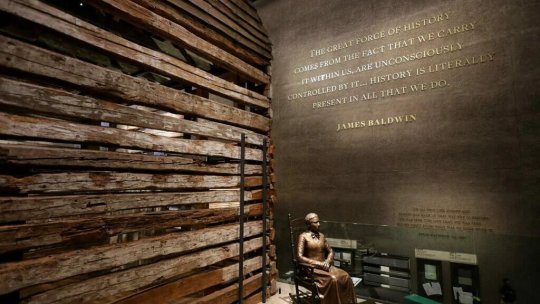
Our names are important to us. They tell us who we are and often, who we come from. So imagine suddenly discovering the last name you’ve always carried… might not actually be the name you should have.
Alex Neason began looking into her family’s history after discovering her great grandfather’s name was different from what she believed for her whole life. In her search to discover the story of that last name, she enlisted genealogist Nicka Sewell-Smith.
For Black Americans, genealogy can fill in the blanks left by the legacy of slavery and racism in the U.S. Services like the Freedmen’s Bureau and Slave Voyages provide free access to records and documents to help with that search. We talk about the power of genealogy in fostering knowledge and connection for Black Americans.
Source
If you click on the word “source,” it’ll take you to the article where you’ll see a LISTEN button. It’s a 30-minute audio that discusses the info provided in the article even further. Y’all know I’m big on getting people to trace their lineage. All that “we don’t know where we come from.” Who told you that? Everything in the US is in plain sight. Everything.
Discover your fam.
I assist others when they reach a roadblock, like getting past the “1870 wall.” But you can’t beat the feeling of you discovering them on your own. Unearthing your history, seeing photos, reading stories that were stored, and saying their names that haven’t been said for centuries. I’ve been tracing mine (scanning, logging) since my family reunion in 2005 through oral family history and obituaries (those are records), and since 2011 through databases of US archived records like ancestry.com (purchased by BlackStone) and familysearch.org (free database owned by the Latter-day Saints Church). There are others, but those are the main two I use for comparative results.
Archiving Centers, Census Records & Other Records
There are archiving centers in every state and DC that also keep records for those particular states and the federal capital. There’s a footnote on all records that tells you where they are housed. And please...Don’t just do a simple pedigree chart of your family tree. Get to know your great-aunts, great-uncles and cousins. It’s also helpful for seeing who lived around who (fam often lived next door to each other) and puts more of the pieces together of your complete family story. You can see the land and acres they owned or your fam today still owns, as well as if that land was stolen from them.
US census records go back to year 1790. Depending on when or if your ancestors were enslaved or free: you’ll find them attached to slave logs that have been made available online or kept in archiving centers (you go there), or or they’ll be listed on census records as free persons (1790-1710), free colored male/female (1820-1840), Black (1850-1920), Mulatto (1850-1890, 1910-1920) or Negro (1900, 1930-1950). “New” census documents are put on sites, like ancestry.com, every 10 years. As of 2023, you can only trace from 1950 to 1790. The 1960 census will be out in 2030. How to trace from 1950 to today, birth, death and residential records. So again, depending on the census year, you’ll notice your ancestors racial classification change throughout documents for obvious reasons.
Keep in mind that the the largest slave trade for the United States was the domestic slave trade. In house human trafficking and selling (in addition to property insurance of enslaved people and the selling of enslaved people as the building block of Wall Street’s stock exchange) is how US capitalism was built. So just because you know a lot of your people are from Tennessee, for example, it doesn't mean that’s where that line stayed. I’ve found my ancestors throughout 7 states (so far). Another example, people with Louisiana roots damn near always have ancestors who were trafficked from early Virginia. Going beyond year 1790, records were kept in Christian and Catholic churches and old family history books so most of those documents are scanned online and/or still kept in the churches. I’m talking books books.
If your ancestors walked the Trail of Tears, or were caught as prisoners of war or trafficked to Indian Nations to be enslaved, you’ll find an Oklahoma Indian Territory and Oklahoma Freedmen Rolls section on ancestry.com. You can discover more info on sites, like the Oklahoma Historical Society. (Every state has its own historical society for archived genealogical records.)
Here’s the National Archives.
Also for Oklahoma, you may also find your ancestors in Indian Census Rolls (1855-1940) as [insert tribe] Freedmen, depending if they weren’t rejected through the “blood quantum” Dawes Rolls for not being the new light to white status. You’ll see their application and the listed questions & answers with or without a big void stamp. And on the census, you’ll even see the letter I (pronounced like eye) changed to the letter B. This is also for those in Louisiana.
Freedmen’s Bureau & Bank Records
There were Freedmen’s Bureau records and Freedman’s Savings Bank records in other states. To see if your ancestors had their records in those systems, you can search by their name. The state and age will pop up with people having that name. It’ll give you a wealth of other info, like all of the kids and other fam if they were present or mentioned to the person who logged that info in. With the Freedmen Bank records, you can see how much money your ancestors put in there (that was later stolen from them by way of the United States government), which is still there today. It’s the biggest bank heist in US history (that they try to keep hush hush) with the equivalence of more than $80 million in today’s value stored in there today. Back then, it was valued almost close to $4 million. Stolen wealth met with bootstrap lectures.
Here’s a short video on that heist:
youtube
Today the bank is called the Freedman's Bank Building, located right on Pennsylvania Ave. Plain sight.
Trace your lineage.
There’s a lot more that I can list. But this is just the basics. Like I said before, it’s a more rewarding feeling when you discover your ancestors by yourself. You may reach roadblocks. Take a break. Try going the “Card Catalog” route on ancestry.com’s search engine. Don’t skip the small details.
SN: Slave Voyages isn’t a genealogical site, but rather a database for slave ship logs and the estimates of purchased Africans who became human cargo to be enslaved by country like USA, or by colonizers like Spain, Great Britain, etc.
#black americans#genealogy#lineage#ancestry#census records#freedmen's bureau#freedman's bureau#freedmen's bank#freedman's bank#american heist
211 notes
·
View notes